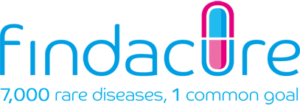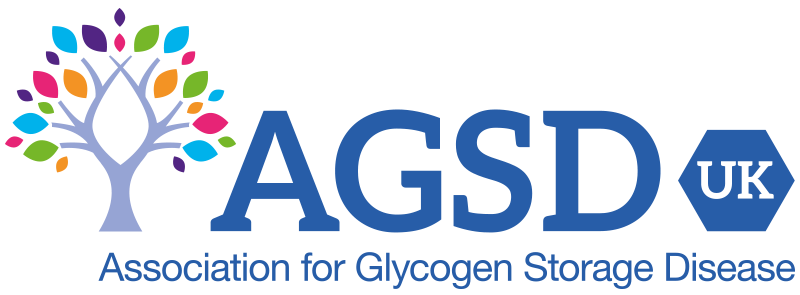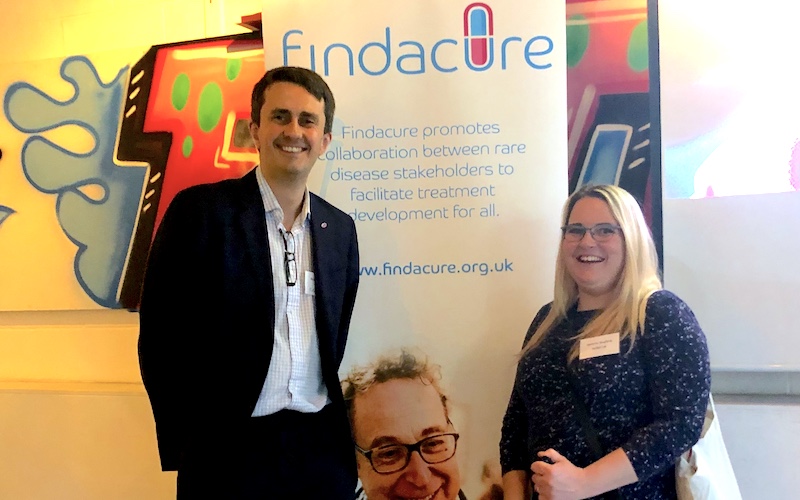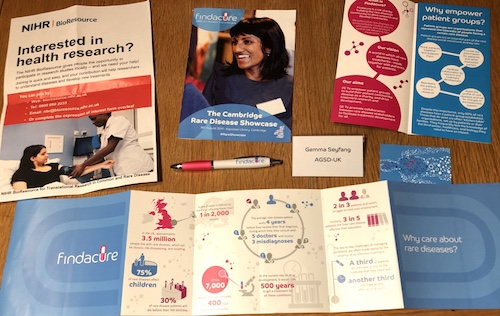 Findacure is a UK charity that is building the rare disease community to drive research and develop treatments, through the various patient groups. They are trying to transform the world’s understanding of rare diseases and the devastating impact they can have on people’s lives.
Findacure is a UK charity that is building the rare disease community to drive research and develop treatments, through the various patient groups. They are trying to transform the world’s understanding of rare diseases and the devastating impact they can have on people’s lives.
Showcase and networking event
On 8th August Findacure organised a showcase and networking event on rare diseases in their home city of Cambridge, and AGSD-UK was represented by Gemma Seyfang of the Pompe Support Team.
Gemma did her research before the event by reading up the programme and the subjects that the six “lightning” speakers were covering.
Rick Thompson – CEO, Findacure.
Rick opened the showcase by giving us some facts. It’s estimated to take on average four years for those with a rare disease to receive their diagnosis. There are around 7000 rare diseases but only about 400 have licensed treatments. Findacure focus on collaborative projects. One of their visions is to work directly with patient support groups to give them the confidence to recognise their own expertise in their rare conditions. Rick also mentioned a magazine called “Rare Revolution” which we hope to get involved with.
Sofie Ashford – Operations Lead, NIHR Bioresource, University of Cambridge.
Sofie spoke about transitional research. They are facilitating research in clinical trials whereby they are asked for specific types/groups of people, which can include healthy people as well rare disease patients. They recruit nationwide.
Katy Baker – Vice President Welfare, Northampton Students’ Union.
Katie has a rare disease herself and is a fantastic advocate. She shared her experiences regarding feeling isolated and lonely, worrying about the family’s feelings which then caused anxiety. Many things can add to the patient’s anxiety: misdiagnosis, repeated hospital appointments, the need to be your own advocate (particularly when in hospital), wanting to feel better. Katy offers support to those students who are suffering with mental health issues at Northampton University, by listening to their worries.
Dr Steve Webster – Lecturer in Innate Immunity, University of Cambridge.
Steve talked about targeting mitochondrial reactive oxygen species (mROS) in immunodeficiency. His research focuses on the innate immune system, the most ancient component of our defence against infection which detects and responds to bacterial pathogens, and how these defences are linked to inflammatory diseases.
Liam Eves and Dr Tony Hall – Chief Business Officer and Chief Medical Officer, Aparito.
They spoke about wearable devices and disease-specific mobile apps to deliver a better understanding of the impact of rare diseases on patients’ lives. Such technology can collect data which is uploaded via Bluetooth to a mobile app and transferred to the trial’s sponsor. Quality of life data could be collected by the device, it could record events and obtain a deeper view of what is happening to the patient. The wearable device could record steps, heart rate, sleep pattern, etc and be customisable to the trial. It could have videos, reminders to take medication, etc. I was super impressed with their talk. As a trial participant myself I know the methods used to collect data could be more accurate and extensive.
Stephen Jones – Chair, Action for Pulmonary Fibrosis.
Stephen covered idiopathic pulmonary fibrosis (IPF) regarding priority setting for patient support and research. He lived with IPF for eight years before receiving a lung transplant in 2016. He is a member of the executive board of the EU-IPFF and spoke about global equality.
Dr Valeria Nicoli-Carr – Global Director Patient Services, Patient Primary.
Dr Valeria spoke regarding retention challenges and why patients drop out of clinical trials. Participants can experience anxiety, find it too big a commitment, forget to attend sessions, or feel it is not relevant to them. There is often a 30% drop out rate, which can have implications on integrity of the data, is costly and slows the process. Patient Primary want to tackle ways to keep participants happy and motivated and have the best technology to smooth the reporting process.
Future co-operation
Overall, this was a successful event and will hopefully lead to further co-operation between AGSD-UK and Findacure.
Main photo: Rick Thompson, CEO Findacure and Gemma Seyfang, AGSD-UK.
Second photo: All the information which Gemma collected at the event.


